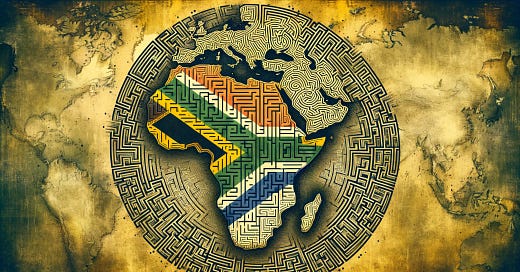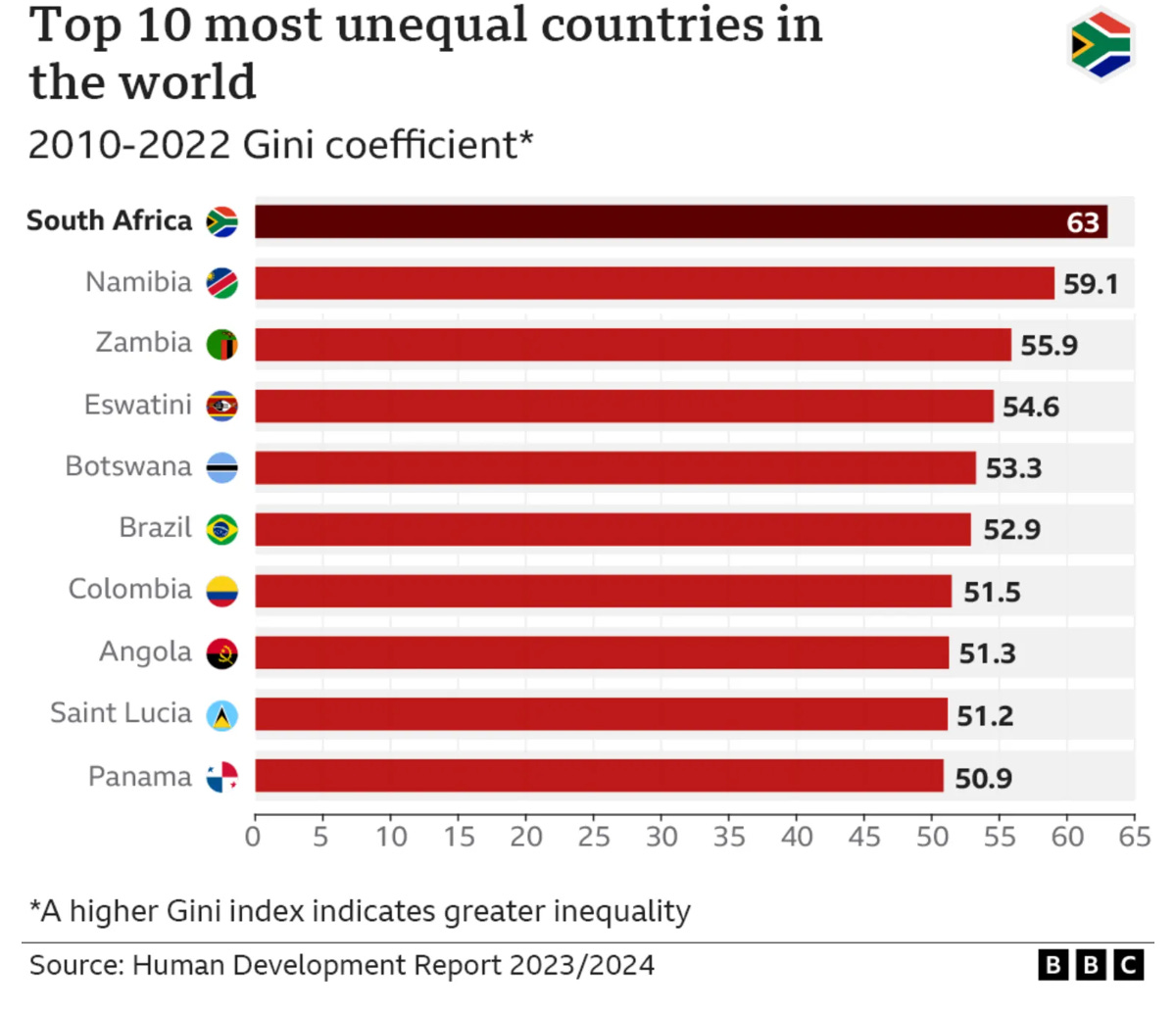South Africa General Election: Macro Risks Unveiled
Why is the upcoming South African general election the most important in the past 30 years, and what does it say about global geopolitics?
South Africa is headed towards its first-ever coalition government at the national level since the end of apartheid in 1990. Options for government coalitions are land-mined with ideological incongruences and raise the macro risk profile of South Africa.
General Election Breakdown
The African National Congress (ANC), led by President Cyril Ramaphosa, which has been the dominant political force since 1994, is facing a significant challenge. Polls indicate that the ANC's support may drop below 50%, necessitating a potential coalition to maintain power.
Some of this can be attributed to widespread dissatisfaction with the party's handling of corruption, economic mismanagement, service delivery issues, frequent power outages, and failing infrastructure.
Opposing parties are now using this as tinder to set aflame.
The Democratic Alliance (DA) and the Economic Freedom Fighters (EFF) are gaining ground. The DA is center-right, focusing on free-market policies and governance reforms, while the EFF is far-left, advocating for radical economic transformation and land expropriation without compensation
While their popularity has grown, the Spear of the Nation (uMkhonto weSizwe) (MK) party led by former president Jacob Zuma, could also split ANC's support base.
The latest polls show the ANC leading at ~40%, the DA at 21.9% (constituting the primary opposition party), EFF at 11.5%, and MK at 8.4%.
If the election results fall in line with current pilling, a coalition government is a probable outcome. However, forming stable coalitions will be challenging due to ideological differences between parties like the DA and EFF.
There are more similarities than differences between the ANC and DA, and are therefore a more likely coalition. Furthermore, "Mr. Ramaphosa chaired the ANC committee that expelled Julius Malema, the EFF leader, in 2012, so there is little love lost between them”.
Historically speaking, there is no clear indication of whether single-party/majority cabinets outperform coalition-formed governments. It is highly contextualized by country, domestic finances, global macro dynamics, and geopolitical considerations.
Having said that, single party governments are usually more politically stable. With fewer changes in government and more consistent policy direction, they are also better at typically implementing austerity measures and fiscal discipline. Unlike a coalition government, it does not require extensive negotiation with other parties to reach a multipolar consensus.
So which might be best for South Africa’s economic, financial, and geopolitical stability? Under the current macro circumstances, a sense of urgency in reforms is needed, but an ANC-majority may not be the answer. The data shows the stewardship under Mr. Ramaphosa has been disappointing, and the polls growing discontent.
Macroeconomic Implications
The Economist correctly pointed out that: “On average, the unemployment rate has risen by about half a percentage point annually since 1994, to 33%, and is the highest in the world. GDP per person is lower than it was 15 years ago”.
Last year, South Africa ranked as the seventh most crime-ridden country globally, surpassing even Honduras, Libya, and Syria in terms of crime rates. At the same time, the country’s public debt has also been increasing, posing a challenge for fiscal policy, with the debt-to-GDP ratio standing around 70%.
The poverty rate also consistently rose from 57% in 2015 to 62.7% in 2024, with 44% of people aged 15-24 not in education, employment, or training. This may also help explain how and why South Africa ranks as the country with the highest Gini coefficient of 63.
While not widely agreed upon, the OECD has reported that when the Gini coefficient exceeds 0.4, the negative impact on economic growth becomes more pronounced. Countries with Gini coefficients above this level often experience slower and less sustainable growth.
Collectively, this has major macro-financial implications.
Financial Implications
South Africa is currently allocating more resources to servicing debt than to healthcare spending. In 2022, around 12% of government revenues went towards debt repayment. The country also ranks 15th among 25 heavily indebted states, faring worse than nations like Nigeria and Turkey.
In March, parliament passed a bill enabling land expropriation without compensation for the public interest. Then on May 15th, the president signed into law a national health care bill, despite the absence of a clear funding mechanism. These kinds of measures will compound pre-existing debt burdens.
Financial developments reflect a bleak outlook from foreign investors. An attempt from Australian mining giant BHP to acquire London-based Anglo American but excluding its South African operations underscores the negative perception of South Africa's investment climate.
According to a survey by the Fraser Institute to calibrate the financial attractiveness of various mining jurisdictions, South Africa is now ranked 62nd out of 86 countries, worse than the Congo and the living nightmare of its cobalt mines.
Furthermore, the environment of high interest rates - particularly out of the US - are having spillover effects onto emerging market economies (EMs). Historically, higher U.S. rates have been associated with investors withdrawing capital from EMs, leading to currency depreciations and greater financial vulnerability for these economies.
Foreign direct investment (FDI) has continued to shrink after peaking in 2021. For the full year 2023, South Africa's direct investment inflows are estimated to have fallen to around $6.1 billion, down from $9 billion in 2022 and a record $40.9 billion in 2021.
Ongoing challenges like power outages, policy uncertainty ahead of elections, high operational costs etc, may also continue weighing on FDI attraction in 2024. And to top it off, the general elections have may major geopolitical implications with domestic consequences.
International Relations
The rise of the EFF, with its pro-China and pro-Russia stance, could shift South Africa's foreign policy, impacting its relationships with Western countries and BRICS partners. The EFF has participated in and supported joint military exercises with Russia and China, despite criticism from the US.
The same party has also echoed Beijing’s rhetoric against Western dominance and has advocated for stronger ties with China, seeing them as a crucial partner in their vision for economic transformation and development.
Russia's economic ties with South Africa, although smaller in comparison to China, are significant in strategic sectors such as energy and defense. The historical ties between the ANC and Russia, dating back to the anti-apartheid struggle, also play a role in maintaining these connections.
As a result, the ANC has put tariff-free access to America at risk by allying itself with Russia and Iran. South Africa signed the African Growth and Opportunity Act. (AGOA) aU.S. trade framework that significantly enhances market access.
However, AGOA eligibility is contingent upon meeting certain criteria, including the:
Establishment of a market-based economy
Rule of law
Political pluralism
Elimination of barriers to U.S. trade and investment.
and most importantly: eligible countries must not engage in activities that undermine U.S. foreign policy interests.
If South Africa’s foreign policies are perceived to conflict with the U.S. interests, it could lead to a review and potential revocation of its AGOA eligibility. Losing AGOA benefits would mean South Africa would no longer have tariff-free access to the U.S. market for a wide range of products.
This would increase the cost of South African exports to the U.S., making them less competitive compared to products from other countries that continue to enjoy AGOA benefits.
Geopolitics cannot be separated from the economy or markets.
The modern economic-financial labyrinth is plagued by the minotaur of evolving geopolitical risks. The South African general election is one participant of many attempting to navigate a maze with a mind of its own.
It is a labyrinth with one entry, questionable exits, and an unyielding minotaur of geopolitical hazards waiting for the right moment to strike. Pay attention.





